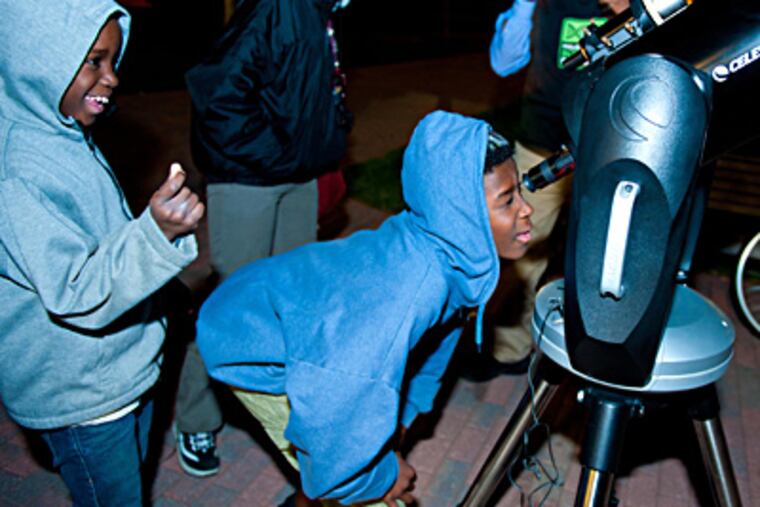Sciences will be the star at 2d annual Philadelphia festival
When people think of Philadelphia, they might imagine cheesesteaks and Rocky, the Phillies and the Flyers. They don't necessarily think of our city as an intellectual hub or a center of scientific research, but they should, said Steve Snyder, vice president for exhibit and program development at the Franklin Institute.

When people think of Philadelphia, they might imagine cheesesteaks and Rocky, the Phillies and the Flyers. They don't necessarily think of our city as an intellectual hub or a center of scientific research, but they should, said Steve Snyder, vice president for exhibit and program development at the Franklin Institute.
This region is packed with top-notch universities, illustrious science museums, and booming technology-oriented businesses. Philadelphia is among the top five U.S. cities in National Institutes of Health grants, Snyder said.
Several years ago, Snyder thought he could perhaps help Philadelphians better appreciate the scientific capital of their own city by staging science festivals similar to those that had become popular in Europe. So he teamed with university and museum leaders from MIT, San Diego State University, and the University of California San Francisco.
Together, they secured more than $1 million in grant money from the National Science Foundation to stage science festivals here and in Cambridge, Mass., San Diego, and San Francisco for three years starting in 2011.
The second Philadelphia Science Festival starts today and runs through April 29. Like last year, there will be lectures, demonstrations, telescope viewings, cabaret performances, and a science carnival on the parkway on Saturday. Last year, Snyder said, the carnival alone drew more than 10,000 people.
The Philadelphia events are all done in collaboration with more than 100 partners, including the region's many universities, museums, and technology-oriented companies. Dow Chemical Co. is a major sponsor of the event. Snyder said the lesson he learned from last year was that the events with the most resonance were the ones that invited the public to participate.
One of the most popular was astronomy night. Astronomers with telescopes were stationed in 27 locations around the area. People lined up around the block – many had never seen one of our neighboring planets through a telescope before.
Presentations over the week range from the practical to the inspirational. In a talk called Farm to Fork: Dangerous Foods – Facts, Fears and Foibles, you can learn whether the "five-second rule" really counts, and when you really shouldn't drink that expired milk. That takes place on Tuesday at Rembrandt's.
Also at Rembrandt's is a program Monday on orphan diseases and the scientists who have devoted their careers to alleviating them.
Among the speakers there will be Frederick Kaplan, a professor of orthopedic molecular medicine at the University of Pennsylvania, who has been on a lifelong quest to help people with a debilitating and ultimately fatal disease, fibrodysplasia ossificans progressiva, known as FOP.
And at the Chemical Heritage Foundation Tuesday night, there will be a science cabaret show. Scientists will get "20 minutes to perform amazing demonstrations to entertain and enlighten while the audience will help determine the winner of the coveted Golden Spoon trophy."
This year's astronomy night, offering telescope viewing at sites around the region, falls on April 27. Independence Seaport Museum and the Battleship New Jersey will have celestial navigation talks. And because many frogs are, like stars, best observed at night, the John Heinz National Wildlife Refuge will host a frog watch.
At the Franklin Institute, there will be a screening of a film, The City Dark, with discussion afterward by Franklin chief astronomer Derrick Pitts and John Mather, listed in the program as a NASA senior astrophysicist. Mather also happens to have won a Nobel Prize in physics for measuring characteristics of the cosmic microwaves that emanated from the big bang.
Snyder sees the science festival as an antidote to today's widespread science illiteracy and outright denialism of science. He said he hoped the program could educate people and remind them of Philadelphia's proud scientific heritage. "I hope this lets us celebrate how much science happens right here."